

Hermeticism. Not to be confused with Hermit.
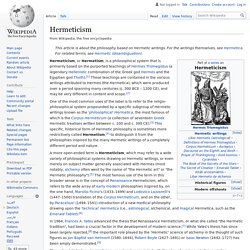
Hermeticism, also called Hermetism,[1][2] is a religious and philosophical/esoteric tradition based primarily upon writings attributed to Hermes Trismegistus ("Thrice Great").[3] These writings have greatly influenced the Western esoteric tradition and were considered to be of great importance during both the Renaissance[4] and the Reformation.[5] The tradition claims descent from a prisca theologia, a doctrine that affirms the existence of a single, true theology that is present in all religions and that was given by God to man in antiquity.[6][7]
Dionysus. Ancient Greek god of winemaking and wine Dionysus (; Greek: Διόνυσος) is the god of the grape-harvest, winemaking and wine, of fertility, orchards and fruit, vegetation, insanity, ritual madness, religious ecstasy, festivity and theatre in ancient Greek religion and myth.[2][3][4] He is also known as Bacchus ( or ; Greek: Βάκχος, Bákkhos), the name adopted by the Romans;[5] the frenzy he induces is bakkheia.
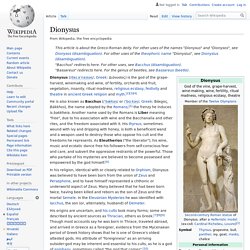
Another name used by the Romans is Liber meaning "free", due to his association with wine and the Bacchanalia and other rites, and the freedom associated with it. His thyrsus, sometimes wound with ivy and dripping with honey, is both a beneficent wand and a weapon used to destroy those who oppose his cult and the freedoms he represents. Neoplatonism. Strand of Platonic philosophy that emerged in the 3rd century AD Neoplatonism is a strand of Platonic philosophy that emerged in the second century AD against the background of Hellenistic philosophy and religion.[1][note 1][note 2] The term does not encapsulate a set of ideas as much as it encapsulates a chain of thinkers which began with Ammonius Saccas and his student Plotinus (c. 204/5 – 271 AD) and which stretches to the 5th century AD.
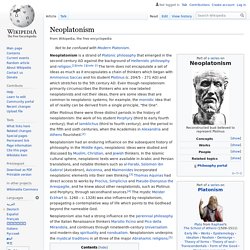
Even though neoplatonism primarily circumscribes the thinkers who are now labeled neoplatonists and not their ideas, there are some ideas that are common to neoplatonic systems; for example, the monistic idea that all of reality can be derived from a single principle, "the One". Neoplatonism had an enduring influence on the subsequent history of philosophy. Delphic Maxims. The Delphic Maxims are a collection of 147 maxims that are understood to be delivered by the deity Apollo Himself to the Oracle at Delphi, who divinely inspired the Seven Sages, seven early-6th-century BCE philosophers, mystics, politicians, and law-givers, who wrote them down.
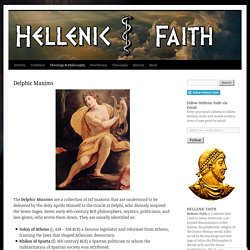
They are usually identified as: Solon of Athens (c. 638 – 558 BCE) a famous legislator and reformer from Athens, framing the laws that shaped Athenian democracy.Khilon of Sparta (fl. 6th century BCE) a Spartan politician to whom the militarization of Spartan society was attributed.Thales of Miletos (c. 624 – c. 546 BCE) is the first well-known philosopher, mathematician, and astronomer.
They provide a framework for life of an honest, worthy way of living. They are guidelines and advice, not absolutes, as our ability to think and act for ourselves is a great good that is part of the soul’s essence. You cannot read the Delphic Maxims as absolutes. 4. Delphic Maxims (uncompared to PDF). A website dedicated to Julian Hellenism, a form of Later Graeco-Roman polytheism primarily influenced by the teachings and writings of Julian the Philosopher and the divine Iamblichus.
Daedalus. Greek mythological figure Family[edit] Mythology[edit] The Labyrinth[edit] Daedalus is first mentioned by Homer as the creator of a wide dancing-ground for Ariadne.[14] He also created the Labyrinth on Crete, in which the Minotaur (part man, part bull) was kept.
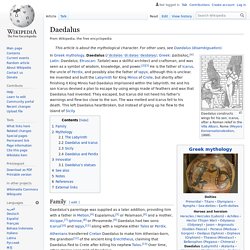
In the story of the labyrinth as told by the Hellenes, the Athenian hero Theseus is challenged to kill the Minotaur, finding his way with the help of Ariadne's thread. In Homer's language, daidala refers to finely crafted objects. Daedalus and Icarus[edit] Print of Icarus falling after his wings got broken.[22] The most familiar literary telling explaining Daedalus' wings is a late one, that of Ovid: in his Metamorphoses (VIII:183–235) Daedalus was shut up in a tower to prevent the knowledge of his Labyrinth from spreading to the public. Wisdom of Hypatia. Three Degrees of Wisdom: Epicureanism, Stoicism, and Neoplatonism. Written by Bruce J.
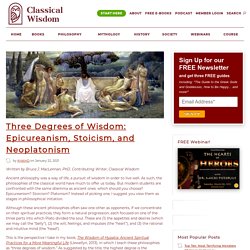
MacLennan, PhD, Contributing Writer, Classical Wisdom Ancient philosophy was a way of life, a pursuit of wisdom in order to live well. As such, the philosophies of the classical world have much to offer us today. But modern students are confronted with the same dilemma as ancient ones: which should you choose? Epicureanism? Although these ancient philosophies often saw one other as opponents, if we concentrate on their spiritual practices, they form a natural progression, each focused on one of the three parts into which Plato divided the soul. This is the perspective I take in my book, The Wisdom of Hypatia: Ancient Spiritual Practices for a More Meaningful Life (Llewellyn, 2013), in which I teach these philosophies as “three degrees of wisdom.” Epicureanism Therefore, Epicureans classify human desires as either natural (part of human nature), or non-natural (e.g., power, fame, fortune). Moderating desire leads to self-sufficiency, which leads to freedom.
Stoicism. Three Degrees of Wisdom: Epicureanism, Stoicism, and Neoplatonism. Greek Gods and Goddesses.